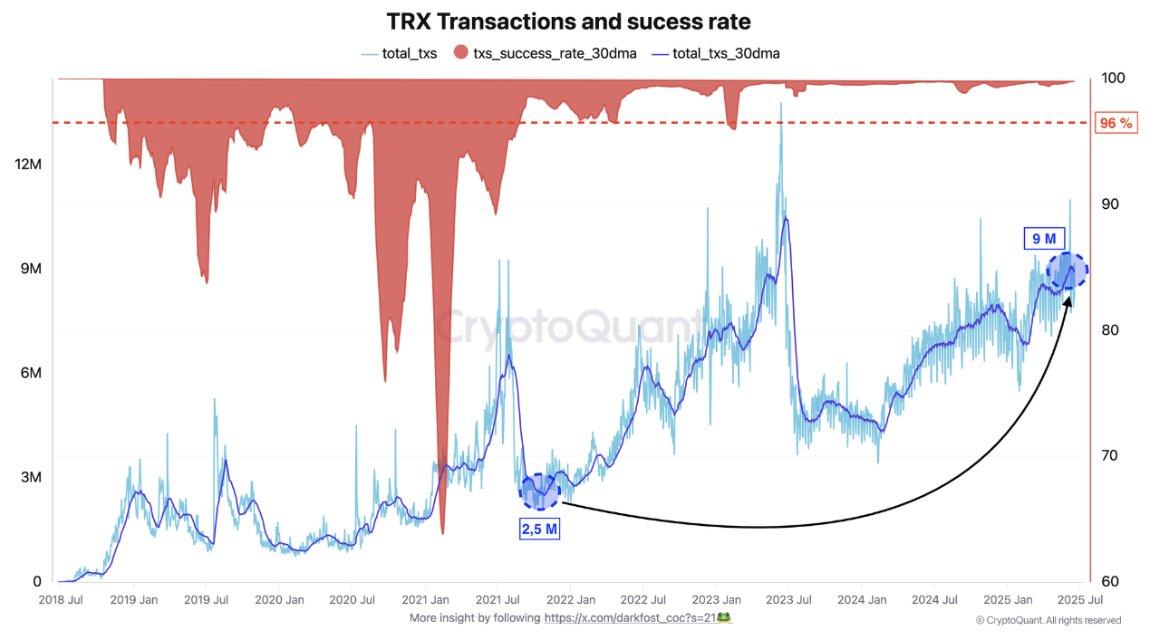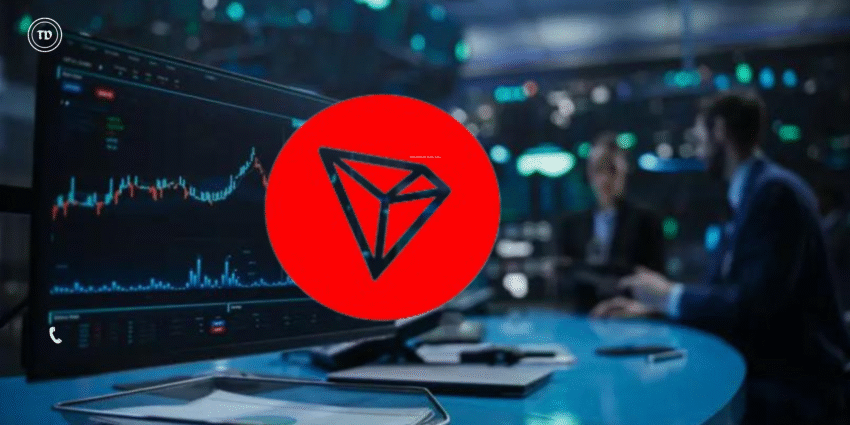In the ever-evolving world of blockchain and cryptocurrency, performance and scalability are critical to long-term success. The TRON Network, one of the most active blockchain platforms in the world, has recently achieved a significant milestone: 6 million daily transactions with an impressive 96% success rate. This development not only highlights TRON’s technical prowess but also signals increased adoption and utility.
Let’s break down this achievement and explore its implications through the following key points:
📈 Transaction Surge: What’s Fueling TRON’s Rapid Growth?

The TRON blockchain has experienced a remarkable surge in transaction volume, recording over 6 million daily transactions consistently in 2025. This puts TRON in the league of top-performing blockchains alongside Ethereum and BNB Chain.
🔹 Key Contributors to This Surge:
-
DeFi and DApp Ecosystem
TRON’s decentralized applications (DApps), including JustLend, SUN.io, and others, have seen increased user activity. The low transaction fees and quick confirmations are especially attractive to retail users. -
TRC-20 USDT Transactions
TRON has become a preferred chain for Tether (USDT) transfers due to its minimal gas fees compared to Ethereum. This has led to millions of small and medium transactions daily. -
Gaming and NFT Activity
Blockchain-based gaming and NFT projects on TRON are contributing to transaction counts. Projects like WINk and APENFT are gaining traction. -
Cross-Border Payment Solutions
TRON’s efficiency and cost-effectiveness make it a viable option for international remittances and B2B payments, further increasing utility.
In summary, TRON’s user base is diversifying, and the blockchain is becoming more than just a token transfer platform—it’s evolving into a comprehensive Web3 ecosystem.
⚙️ 96% Success Rate: A Sign of Network Stability
While transaction volume is important, success rate is an even more telling metric. TRON currently boasts a 96% success rate for daily transactions, reflecting robust network efficiency and operational reliability.
What This Metric Means:
-
Network Congestion Handling
Unlike Ethereum, where high gas fees and slow confirmation times plague users during congestion, TRON maintains a steady flow even under heavy loads. -
Smart Contract Performance
Smart contracts on TRON have a strong execution rate, meaning developers and DApp users experience fewer failed interactions. -
User Confidence
A high success rate builds trust among users and developers, encouraging long-term adoption.
This figure speaks volumes about the scalability and health of the TRON network, especially in times when blockchain outages or delays are not uncommon across other platforms.
💹 Market Trends and Impact on TRX Price
TRON’s on-chain activity is impressive, but how is it impacting the price of TRX, the network’s native token?
Observed Market Reactions:
-
Positive Sentiment
Crypto investors and analysts have taken note of TRON’s growing utility. Market sentiment has shifted positively, and this has been reflected in a moderate uptick in TRX trading volume. -
Stable Price Range
As of mid-2025, TRX has been trading between $0.095 and $0.115, showing resilience amidst broader market volatility. Analysts believe this consolidation could be the base for a breakout. -
Increased Exchange Listings & Partnerships
TRON’s performance has attracted the attention of centralized exchanges and payment processors. As adoption grows, so does the real-world value of TRX. -
Staking and Yield Farming Growth
Higher transaction activity supports staking rewards and DeFi engagement, making TRX more attractive to holders.
Overall, while TRX hasn’t experienced a dramatic bull run, its strong fundamentals are positioning it for long-term growth, especially as more institutional investors evaluate blockchain utility beyond speculation.
🔮 The Road Ahead: Challenges and Opportunities for TRON
Even with its recent achievements, TRON faces both challenges and opportunities as it moves forward.
🔧 Challenges:
-
Regulatory Scrutiny
As a major player in the crypto space, TRON may face increased attention from global regulators, especially regarding stablecoin transfers and decentralized exchanges. -
Competition
Ethereum, Solana, Polygon, and others are innovating rapidly. TRON must continue to improve its infrastructure and developer support. -
Perception Issues
While technologically strong, TRON still struggles with its early reputation. Rebranding and transparent communication may be necessary to attract a broader user base.
🌟 Opportunities:

-
Web3 Expansion
With DeFi, GameFi, and NFTs gaining momentum, TRON is well-positioned to be a leader in Web3 applications. -
Enterprise Partnerships
TRON’s transaction efficiency could appeal to fintech companies and businesses seeking blockchain integration. -
AI and Blockchain Integration
Future updates could integrate TRON with AI-based DApps, creating new avenues for decentralized automation and smart analytics.
If TRON continues at this pace—both in user adoption and performance metrics—it could become one of the leading Layer 1 chains by the end of 2025.
📝 Final Thoughts
TRON’s ability to handle 6 million daily transactions with a 96% success rate is a clear testament to its scalability, stability, and rising adoption. In a blockchain ecosystem where many networks struggle to deliver consistent performance, TRON stands out as a reliable, fast, and cost-effective solution.
With growing utility across DeFi, NFTs, and cross-border payments, TRON is not just surviving — it’s thriving. While challenges remain, its robust infrastructure and user-first approach are likely to keep it in the spotlight for years to come.
Whether you’re a trader, investor, developer, or DApp user, keeping an eye on TRON’s evolution in 2025 might just be your smartest move yet.
Frequently Asked Questions
What is TRON’s recent transaction milestone?
TRON recently hit over 6 million daily transactions.
What is TRON’s transaction success rate?
TRON maintains a 96% transaction success rate.
What drives TRON’s high transaction volume?
DeFi apps, USDT transfers, and NFT activity fuel the volume.
Is TRON cheaper than Ethereum for transactions?
Yes, TRON offers significantly lower transaction fees.
What role does USDT play in TRON’s activity?
TRON is a leading network for fast, low-cost USDT transfers.
How does TRON compare to Ethereum in speed?
TRON is generally faster with quicker confirmations.
Does TRON support smart contracts?
Yes, TRON supports efficient smart contract execution.
Is TRX price affected by this transaction growth?
Yes, increased utility has led to higher market confidence.
Can TRON handle network congestion well?
Yes, it handles high volumes with minimal delays.
Is TRON a good platform for developers?
Yes, it offers scalability, low fees, and growing user adoption.

